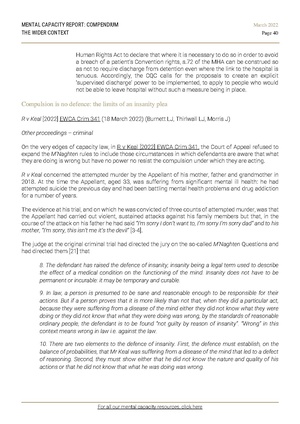R v Keal [2022] EWCA Crim 341
Essex
This case has been summarised on page 40 of 39 Essex Chambers, 'Mental Capacity Report' (issue 121, April 2022).
ICLR
The ICLR have kindly agreed for their WLR (D) case report to be reproduced below. For full details, see their index card for this case.
The WLR Daily case summaries
Court of Appeal
R v Keal
2022 March 18
Lord Burnett of Maldon CJ, Thirlwall LJ, Morris J
Crime— Insanity— M’Naghten rules— Attempted murder— Whether defence of insanity available to psychotic and deluded defendant aware that his act was wrong but believing himself to be compelled to perform it.
The defendant attacked his father, mother, and grandmother in a frenzied manner with an array of weapons. Charged on three counts of attempted murder, he pleaded insanity. His father gave evidence that, during the attack on him, the defendant apologised and, on his father saying that he was killing him, the defendant responded “I know I’m sorry I don’t want to, I’m sorry I’m sorry dad”. The defendant’s mother gave evidence that, during the attack on her, the defendant shouted “I’m sorry this isn’t me it’s the devil”. The defendant had a history of mental health problems, attention deficit hyperactivity disorder and drug addiction. Four psychiatrists gave evidence. They agreed that at the time of the incident the defendant was seriously mentally ill, was psychotic and deluded, had an impaired his capacity for rational thought, and was suffering from a disease of the mind that led to a defect of reason. They also agreed that at the time of the incident the defendant knew the nature and quality of his actions. They disagreed to what extent the defendant’s disordered mental state impaired his ability to know that what he was doing was wrong. Two thought that, although the defendant might have acted in response to delusional beliefs, his actions and his later explanation did not suggest that he thought he was acting lawfully, and they concluded that on the balance of probability he did know that what he was doing was wrong, The other two thought that the defendant’s mental state was so disturbed that at the time of the offences he was unable to form a rational understanding of right and wrong. The defence submitted that the defence of insanity was available to a psychotic and deluded defendant who was aware that his act was wrong but believed himself to be compelled to perform it. The trial judge did not accept that submission and directed the jury in accordance with the M’Naghten Rules. The defendant was convicted. He appealed on the grounds that the trial judge had erred in law in failing to direct the jury that, where a defendant's delusion operated so as to deny him agency, his culpability was the same, whether or not he was conscious that his act was wrong and the defence of insanity was available to a psychotic defendant who was aware that his act was "wrong" (within the meaning of the M'Naghten Rules) but whose delusion was such that he was compelled to perform it or powerless to prevent it. A further ground was that the M'Naghten Rules should be reformulated in contemporary language.
On the appeal—
Held, appeal dismissed. In order to establish the defence of insanity within the M'Naghten Rules on the ground of not knowing the act was "wrong", the defendant had to establish both that (a) he did not know that his act was unlawful (ie contrary to law) and (b) he did not know that his act was "morally" wrong (also expressed as wrong "by the standards of ordinary people"). Whilst it was necessary to assess the defendant by reference to the facts as perceived through the delusion, that did not obviate the need to consider the primary question of knowledge of "wrongdoing". It could not be accepted that, in principle, the concept of knowledge (or being conscious) of wrongdoing necessarily imported "choice" (or, to use the defence’s term, "agency"). Nor could it be accepted that, unless the M'Naghten Rules comprised an element of "choice", the availability of the defence would depend upon the nature of the delusion. The principle advanced by the defence was contrary to established authority. The defence of insanity as at present did not include an element reflecting lack of capacity to control one's action, ie a defence of irresistible impulse, recommendations to the contrary not having been implemented by legislation. There was an underlying conceptual difficulty in the defendant's case of fitting the element of "choice" into the concept of "wrongdoing" and knowledge of wrongdoing. Accordingly the defence of insanity was, under the M'Naghten Rules, not available to a defendant who, although he knew what he was doing was wrong, believed that he had no choice but to commit the act in question. Any reconsideration of the M'Naghten rules was a matter for Parliament. The judge had directed the jury correctly and the conviction was safe (see paras 41–42, 43–48, 50–53).
M'Naghten's Case (1843) 10 Cl & Fin 200, R v Kopsch (1927) 19 Cr App Rep 50, CA, R v Windle [1952] 2 QB 826, CA, and R v Johnson (Dean) [2007] EWCA Crim 1978M, CA, considered.
Andrew Campbell-Tiech QC and Keely Harvey (instructed by Peter Clarke Solicitors LLP, Southampton) for the defendant.
Kerry Maylin (instructed by Crown Prosecution Service, Appeals Unit) for the Crown.
Philip Ridd, Solicitor
Full judgment: BAILII
Subject(s):
- Unfitness and insanity cases🔍
Date: 18/3/22🔍
Court: Court of Appeal (Criminal Division)🔍
Cites:
Judge(s):
Parties:
Citation number(s):
- [2022] EWCA Crim 341B
- [2022] WLR(D) 129B
- [2022] 2 Cr App R 4, [2022] 4 WLR 41B
- 39 Essex Chambers, 'Mental Capacity Report' (issue 121, April 2022)
- M'Naghten's case [1843] UKHL J16
- Jonathan Wilson, 'Mental health case law: update' (Legal Action, May 2023)
Published: 19/3/22 20:53
Cached: 2024-04-19 04:40:47
